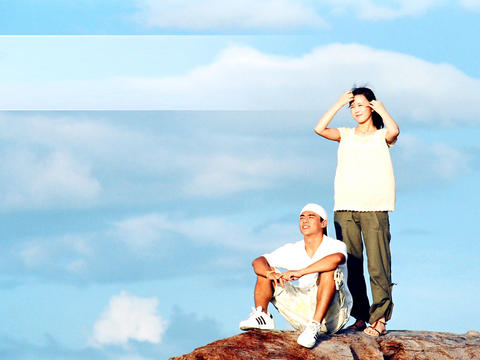Flying fish, the hair dance and Tao (達悟) men in brightly painted canoes: These are the typical travel-guide images of Orchid Island (蘭嶼). Now they can be found in the cinema too. Director Wang Jingui's (王金貴) Pongso No Tao (人之島), which translates as "the island of human beings," is a quest for self, love and home on the lush island where the Tao people lead a simple life farming and fishing.
Starring pop idol Bobby Duo (竇智孔) and emerging young actress Lin Jia-yu (林家宇), the film begins with Meibana (played by Duo), a 26-year-old Tao man, deciding to take a break from his stressful life in Taipei and return to Orchid Island. There he learns to appreciate his people's traditional way of life as he whiles away his time collecting the island's natural sounds with his recordist and mentor A-fei.
Anan, on the other hand is an outsider in self-imposed exile on the island. The unconditional warmth the young woman receives from the islanders as an art teacher at a local elementary school helps her recover from a past traumatic ordeal.

PHOTO: COURTESY OF CHANG TSO CHI FILM STUDIO
Meibana's childhood sweetheart Shichie Anrou, who forms another narrative strand in the film, has adapted to urban life and become a stranger to Orchid Island and Meibana.
Against the backdrop of the clear turquoise sky, Anan and Meibana meet and fall in love. In their search for inner peace, they also find themselves, their own voices and the dreams they want to pursue.
An Aboriginal version of Island Etude (練習曲) and The Most Distant Course (最遙遠的距離) combined, the film is a search for home, be it physical, spiritual or cultural.
Director Wang - who was born in Yunnan, China, raised in Myanmar and educated in Taiwan, where he has lived for the past 27 years - reveals his own yearning for a haven, which is embodied in his portrayal of the Tao community and their respect of and coexistence with nature.
"I met lots of people from the Atayal (泰雅族) tribe when shooting Holy Ridge (聖稄的星光) [a Golden Bell (金鐘獎) Award-winning TV series] and was immediately attracted by their way of life. After that I went to Lanyu for Chang Tso-chi's (張作驥) Soul of a Demon (蝴蝶) [Chang's latest film, which has yet to hit the big screen] and I subsequently decided to tell my own story about the island and its people," Wang said.
A long-term Chang collaborator who has assistant director credits on Chang's Ah-Chung (忠仔) and Darkness and Light (黑暗之光), Wang carries on his mentor's realism in this directorial debut.
The romantic storyline seems to fade into the background at times as the landscapes and nonprofessional actors, mostly Tao natives, are highlighted in the film. Children frolic and laugh on the beach. Herds of goats amble along the seashore. Old men sing ancestral tunes and women dry flying fish in front of stone houses. A series of vignettes thread the plot together, accentuated by a soundtrack by Golden Melody (金曲獎) Award-winning Atayal musician Lee Chih-hsiung (李志雄), who also plays the role of A-fei.
Pongso No Tao has a look and feel that's as simple as the Tao way of life. It may not be riveting or exciting, but it's heartfelt.

On April 26, The Lancet published a letter from two doctors at Taichung-based China Medical University Hospital (CMUH) warning that “Taiwan’s Health Care System is on the Brink of Collapse.” The authors said that “Years of policy inaction and mismanagement of resources have led to the National Health Insurance system operating under unsustainable conditions.” The pushback was immediate. Errors in the paper were quickly identified and publicized, to discredit the authors (the hospital apologized). CNA reported that CMUH said the letter described Taiwan in 2021 as having 62 nurses per 10,000 people, when the correct number was 78 nurses per 10,000

As we live longer, our risk of cognitive impairment is increasing. How can we delay the onset of symptoms? Do we have to give up every indulgence or can small changes make a difference? We asked neurologists for tips on how to keep our brains healthy for life. TAKE CARE OF YOUR HEALTH “All of the sensible things that apply to bodily health apply to brain health,” says Suzanne O’Sullivan, a consultant in neurology at the National Hospital for Neurology and Neurosurgery in London, and the author of The Age of Diagnosis. “When you’re 20, you can get away with absolute

May 5 to May 11 What started out as friction between Taiwanese students at Taichung First High School and a Japanese head cook escalated dramatically over the first two weeks of May 1927. It began on April 30 when the cook’s wife knew that lotus starch used in that night’s dinner had rat feces in it, but failed to inform staff until the meal was already prepared. The students believed that her silence was intentional, and filed a complaint. The school’s Japanese administrators sided with the cook’s family, dismissing the students as troublemakers and clamping down on their freedoms — with

As Donald Trump’s executive order in March led to the shuttering of Voice of America (VOA) — the global broadcaster whose roots date back to the fight against Nazi propaganda — he quickly attracted support from figures not used to aligning themselves with any US administration. Trump had ordered the US Agency for Global Media, the federal agency that funds VOA and other groups promoting independent journalism overseas, to be “eliminated to the maximum extent consistent with applicable law.” The decision suddenly halted programming in 49 languages to more than 425 million people. In Moscow, Margarita Simonyan, the hardline editor-in-chief of the